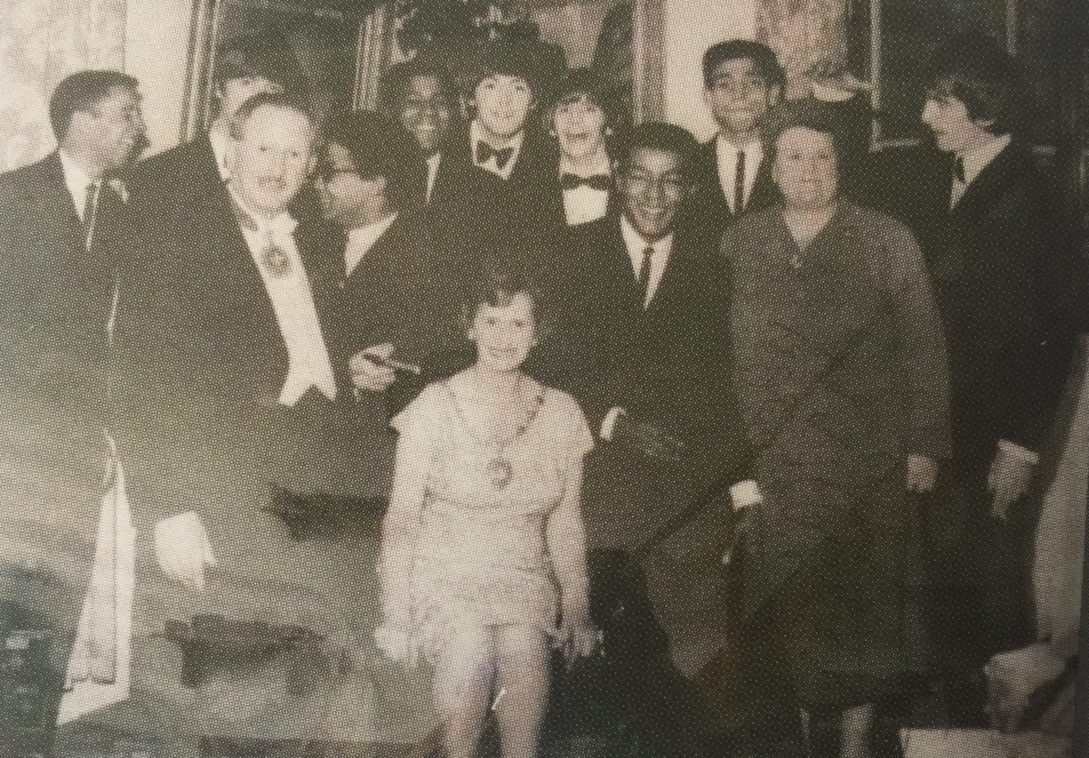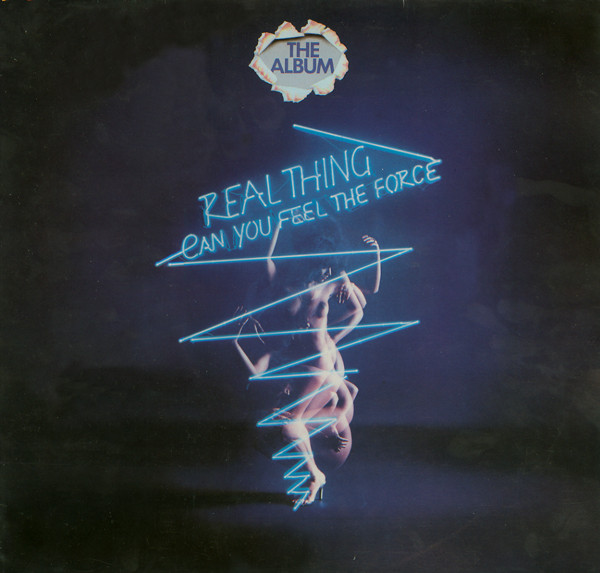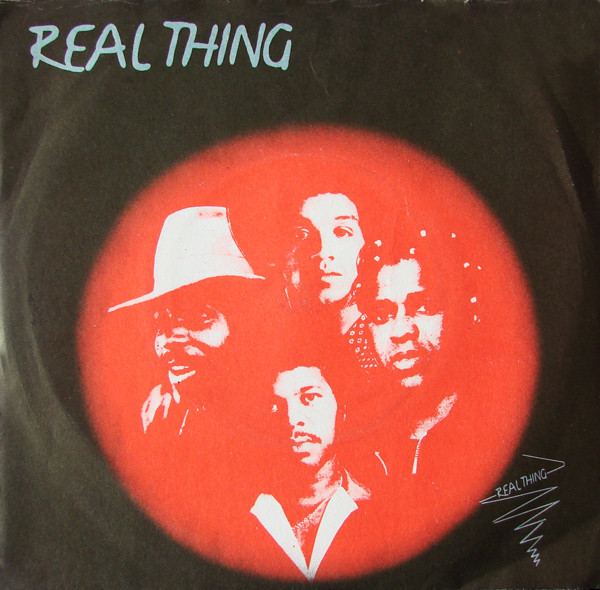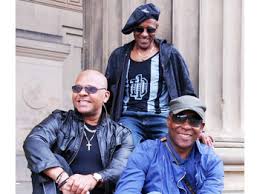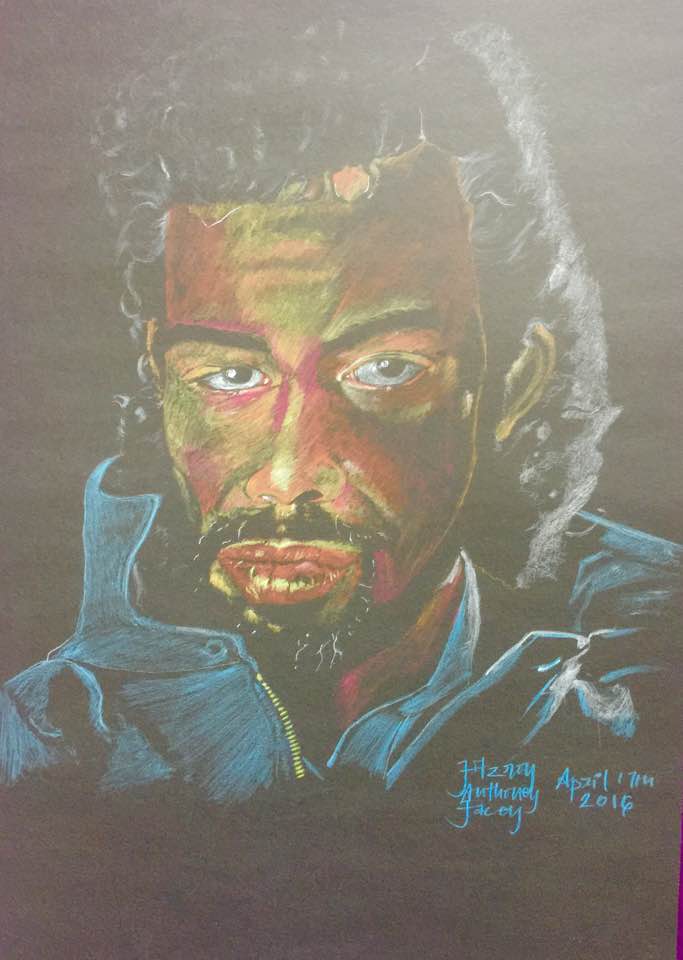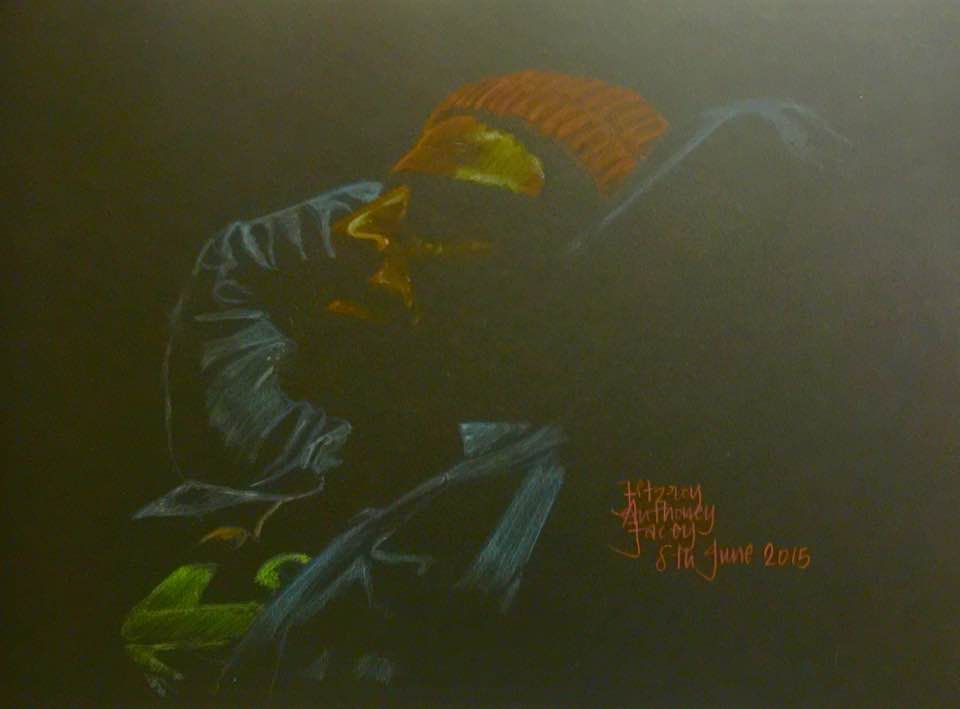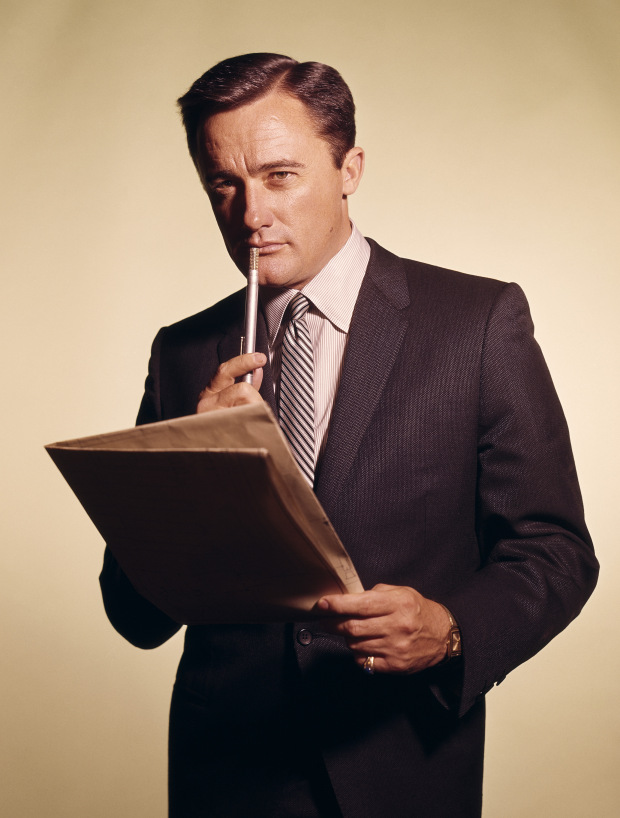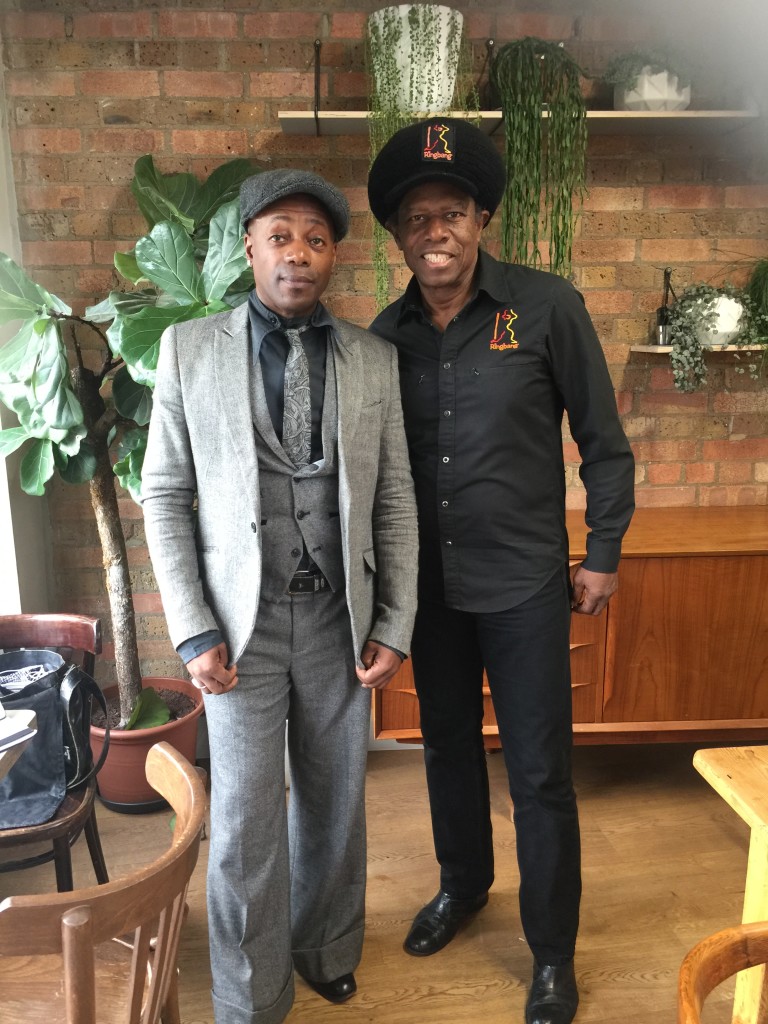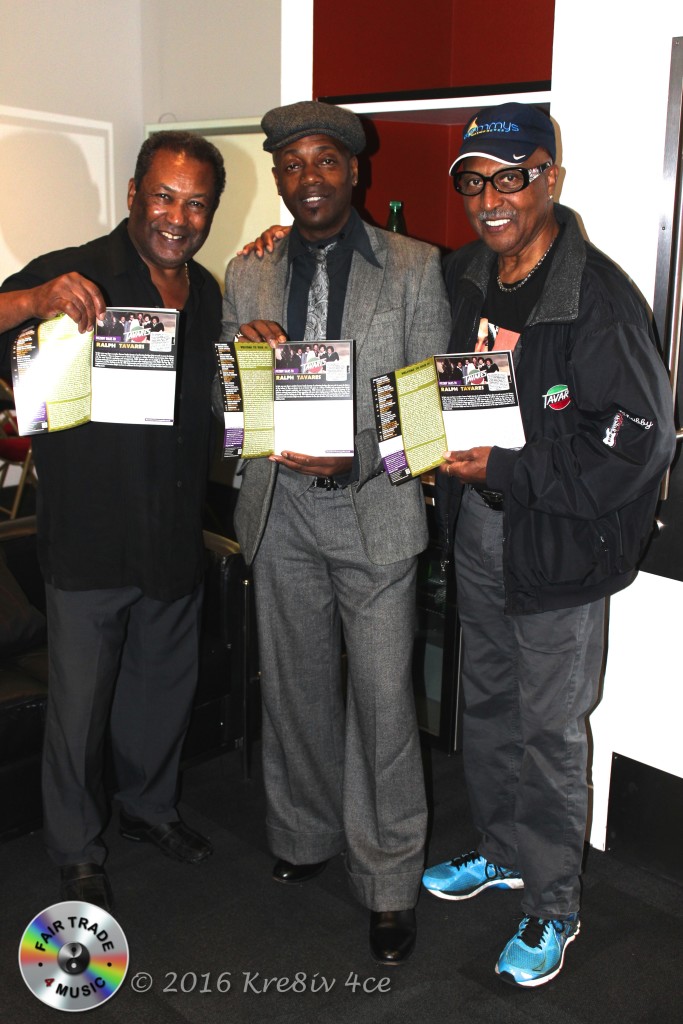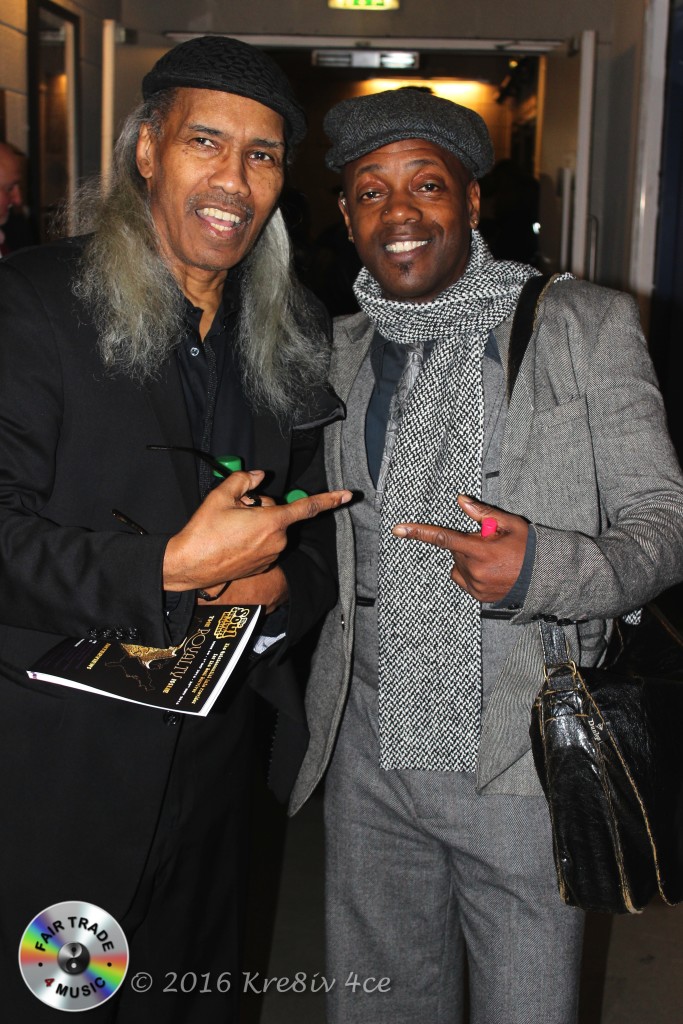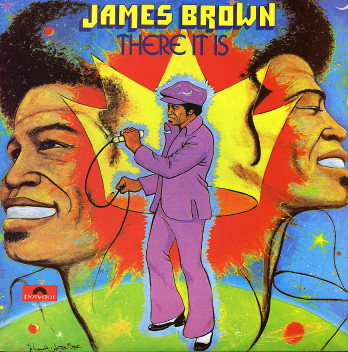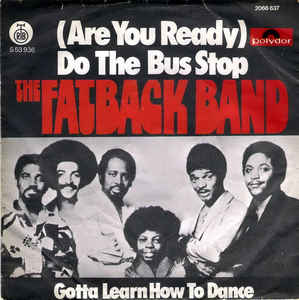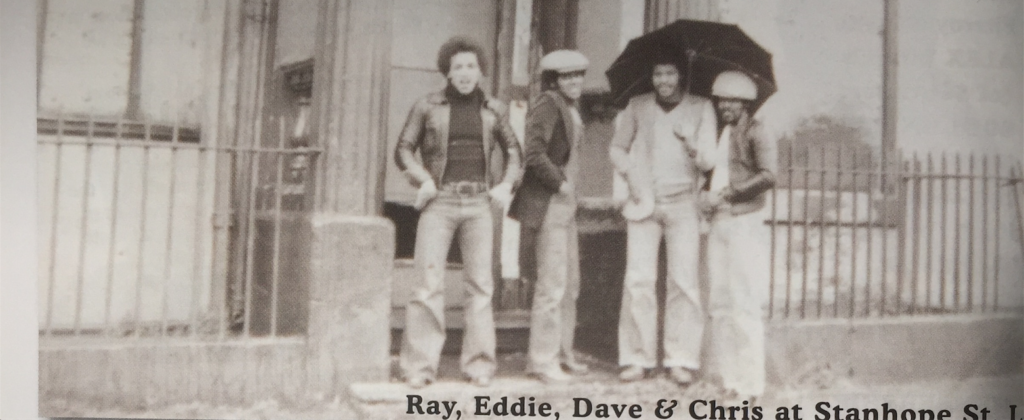 Ahead of The Real Things live concert at Soultrain’s Bank Holiday 25th August 2017 SWX gig, we at The Soul Survivors Magazine share some of the integral history from the memories of two of the groups founder members Eddie & Chris Amoo.
Ahead of The Real Things live concert at Soultrain’s Bank Holiday 25th August 2017 SWX gig, we at The Soul Survivors Magazine share some of the integral history from the memories of two of the groups founder members Eddie & Chris Amoo.
Fitzroy: I’m assuming because of your surname it’s of African origin,how did you and your family experienced life growing up in the Liverpool 8 Toxteth community in your early years of the 1950‘s and 1960’s?
Eddie: My dad, was from Ghana growing up in a poor working class area like Toxteth was tough but happy.To be honest it was so multicultural that I didn’t even become aware of racial differences till we moved out of L 8 when I was 11.I got a bit of a rude awakening when we moved to Myrtle Gardens,(L7 ) as we were the first black family to move in, kids of that peer age can be very cruel.But once we were established and accepted I was happy there.
Fitzroy: What musical artist’s were an inspiration to you as a youngster?
Eddie: My earliest musical influences were The Doo Wop groups like Frankie Lymon And The Teenagers and the R & B sounds of Chuck Berry, Ray Charles, Fats Domino and Little Richard. I was also into the early Rock n Roll of Buddy Holly, Gene Vincent, and the Early Elvis ,and gradually outgrew the latter guys. I was around 12 years old and one of the first things I learnt from watching and performing with the Beatles, was that their main strength was their song writing ability. This set them apart from the rest the bands, as well as them being damn good. So I decided to see if I could write songs even though I had no musical ability.I would make up melodies in my head,write words and sing them to The Chants. They were based on models of songs I liked (The Four Seasons ) ‘Walk Like A Man’ . I wrote a song ‘I Don’t Care’ based on the same type of The Four Seasons harmonies. In the recording studio we got lucky because our first producer Tony Hatch then added the cords and rhythm that really suited the song, in fact it became the bands first single.
Below The Chants and The Beatles in the early 1960’s with Eddie Amoo smiling in the back to the left of Paul McCartney who is standing next to Ringo.
Fitzroy: The Chants continued touring for over ten years you nurtured your songwriting and musical skills further. From around 1972 how did your younger brother Chris’s The Sophisticated Soul Brothers group with some guidance from yourself , start to gain momentum?
Eddie: Well the S S Brothers developed slowly and around 1973 Chris started to emerge as a lead singer. I was going through some stuff on the piano at our mothers house in Englefield Green in L8 when I heard this powerful voice coming from behind me. Realising it was Chris I was astonished at how he’d developed as a singer. I realised instantly that the SS brothers had what The Chants had always lacked, a distinct sound that a special lead voice provides. The Chant’s featured 5 guys with great voices and harmonies without unfortunately that killer distinct lead. It was only a matter of time before someone who mattered would pick up on this, in this case that person was Tony Hall.
Fitzroy: How was life from your perspective being the younger brother of Eddie who was already a pre-teenage superstar and what’s the age difference between you both?
Chris: There is actually 8 years between us. I was still at school when The Chants were famous and it actually instilled in me what I wanted to do. I was very much influenced by my brother Eddie seeing him in the newspapers and on TV nothing was going to stop me from pursuing my dream. As I got older Eddie started to take an interest in how I was progressing which was great. He’d teach me my first notes playing on the guitar and the piano, and this developed to me writing songs. Even though I was just plunking three or four notes on the piano, I was writing songs and Eddie encouraged this in me.
Fitzroy: What was your perspective in coming across this music via the radio and not being able to see the artist? Especially in the early Motown years where they would put white faces on the front covers, so how did you equate they were black?
Chris: I knew because it was different in my time than when Eddie grew up as a teenager. By then Motown had put an end to that nonsense. In the old days in order for an R&B song to get any exposure it would be covered by a white artist. The advent of Motown changed that because Motown was the vehicle. So in my time I knew who the artists were. We would go to the record shops where they had listening booths. On all the walls they had the photos of the black artists. My brother Eddie used to bring a lot of records into the house all of which had black faces on. When Eddie was growing up you wouldn’t know if they were black or white.
Fitzroy: So how did you come together in 1972 to form the Sophisticated Soul Brothers?
Chris: I met Dave Smith when I was still at school. His brother was a friend of Eddie’s best friend before Eddie was in The Chants. We are a big family community in L8 Liverpool and everybody knows each other. We tried to emulate The Chants who were a big deal being seen on TV’s ‘Jukebox Jury’ and being played on the radio. We started to take it a bit more seriously as we realised that this was what we were going to do. We listened to records and found our range sonically. As we started getting better we started meeting and singing every single night with hairbrushes as microphones. We practised for weeks and eventually learned how to harmonise then we started playing at school dances. We got ourselves an agent who handled a lot of the white bands and eventually graduated from The Sophisticate Soul Brothers to becoming Vocal Perfection. What’s interesting is that The Temptations who recorded the very first record that I bought actually changed our vision. Tony Hall our manager bought us tickets to see them in Manchester live and we went in as one band and came out as another. So they definitely had the most impact on us.
Fitzroy: What was it that impacted on you so greatly?
Chris: Our perception of a vocal group was three background vocalists doing a little routine behind a lead vocalist upfront. When we saw The Temptations, it was the first time we saw five microphones as opposed to two, one for the lead and one for the background vocalists. So now we saw five lead singers all with their own microphones coming off a boom stand on arms and this was so visual to us. They would also change microphones with a little bit of flair theatrics. So the next day we started rehearsing how we’d seen them do it, so it was a new way of us presenting ourselves on stage and no one else was doing this.
Fitzroy: How did the recording of ‘Vicious Circle’ come around? 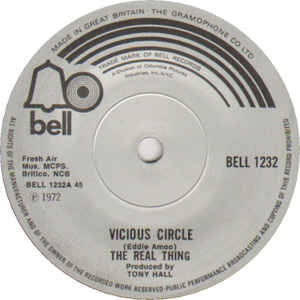
Chris: As Vocal Perfection we hadn’t made any records till we met our manager Tony Hall. We were just doing local gigs and then we landed doing Opportunity Knocks. The evening before Opportunity Knocks Tony thought it would be best if we changed our name to The Real Thing. His view being that we were setting ourselves up with a name like Vocal Perfection because perfection we were not vocally. That’s when we did our first record ‘Vicious Circle’.
Fitzroy: How did you find that whole experience of going onto Opportunity Knocks, meeting Hughie Green and experiencing what was for its time the X Factor and Britain’s Got Talent platform?
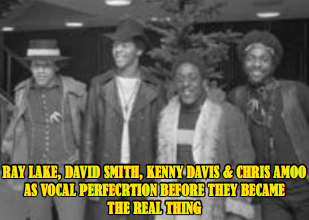 Chris: It was more Britain’s Got Talent than X Factor because a yodeler beat us. It was wonderful Fitzroy because we were on television man. We were walking down in Liverpool City Centre and everyone recognised us. That’s how big the show was. We were no longer doing little clubs but playing all over the country for quite good money. Opportunity Knocks changed everything for us as we could now sustain ourselves professionally. We did Top Of The Pops performing ‘Plastic Man’ that then went into the top 50. Had we made it big at the time of Opportunity Knocks I believe we wouldn’t have been able to sustain it creatively because were not ready.
Chris: It was more Britain’s Got Talent than X Factor because a yodeler beat us. It was wonderful Fitzroy because we were on television man. We were walking down in Liverpool City Centre and everyone recognised us. That’s how big the show was. We were no longer doing little clubs but playing all over the country for quite good money. Opportunity Knocks changed everything for us as we could now sustain ourselves professionally. We did Top Of The Pops performing ‘Plastic Man’ that then went into the top 50. Had we made it big at the time of Opportunity Knocks I believe we wouldn’t have been able to sustain it creatively because were not ready.
Fitzroy: I was 10 years old in 1974 and remember watching Opportunity Knocks and I’m trying to think back but were there ever any other black acts on Opportunity Knocks? 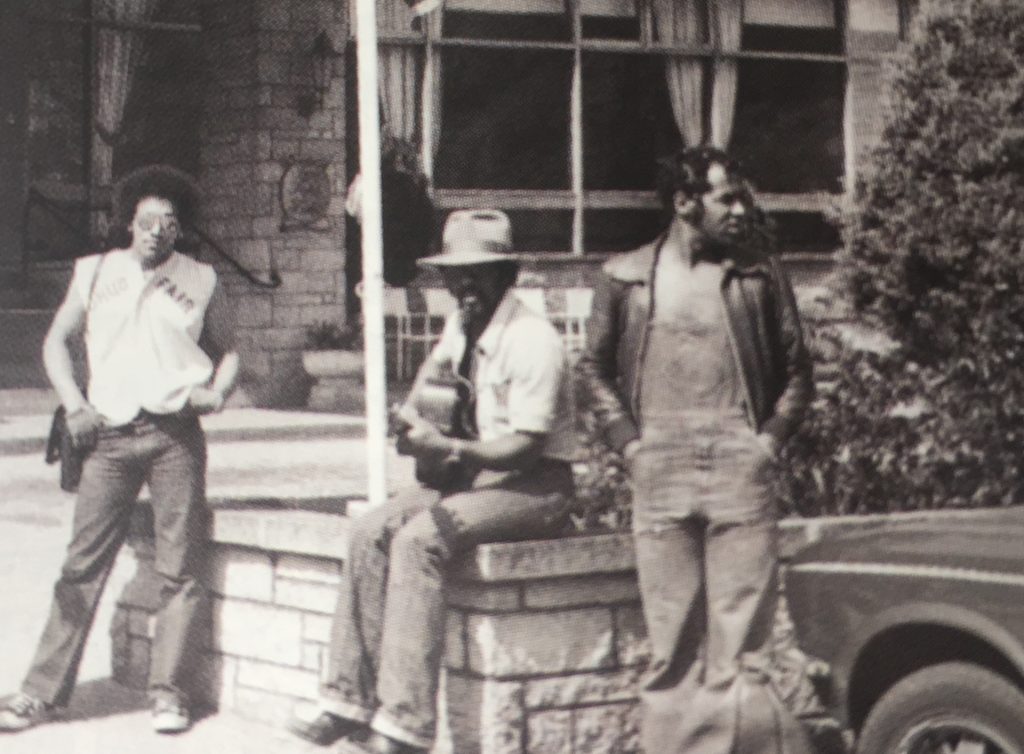
Chris: No, not that I can remember as there weren’t any other acts apart from The Chants who were more on the cabaret scene. Maybe a few years later groups like Sweet Sensation and Heatwave who we used to see all the time.
Fitzroy: So now after Opportunity Knocks and being recognised in your local area you work with David Essex.
Chris: That was our second career phase. We were recording some licenced records and Jeff Wayne came into the office and said he needed some backing vocals for adverts he was making for Cadburys chocolate. I’m sure it was actually The Chant’s he was looking for. Don’t quote me on that, but we went and did the session. Jeff Wayne loved our sound and myself as a lead singer so I started singing lead for Lloyds, TSB and Cadburys adverts. If he wanted harmonies we did Wrigley’s Spearmint Gums and things like that as a group. It was a great thing for us getting extra money for doing session work. That’s how we met David Essex because Jeff was producing him. David fell in love with our rawness and freshness. He felt we were unspoilt and were not trying to emulate the Americans. We were now writing and doing our own material in a show and David loved that about us. He took us to America with him and we met some fantastic musicians during that time.
Fitzroy: What’s you memory of coming across ‘You To Me Are Everything’ which was a departure from what you had done before?
Chris: That was Eddie’s reaction, my first reaction was “Let’s get the thing signed up, as this is a hit”. Tony and me looked at each other and it was something that hit me instantly. I’d say it was signed sealed and delivered on my side before I even met with the rest of the group later that evening. Everybody knew it was a great pop song and yes it was a departure from what we were writing which was some pretty heavy stuff at the time. We were performing on stage and papers like Melody Maker and NME used to review the show which was different to what everyone else was doing. When we actually recorded it I thought that the demo was better than ours but when it was finished the result is now history.
Fitzroy: I’m not sure if you’ve seen the previous issue where I spoke with Patrick Adams. He spoke of doing a version of ‘You To Me Are Everything’ that was rushed out before Ken Gold could get a distribution deal with a big advance. I’ve heard that version as I have many others including Frankie Valli’s awful version, but there is a good one by Samona Cooke. After The Chants, The Real Thing were the next pioneering black vocal group to be successful and potentially conquer America, so were you aware of the politics that prevented, in my view, why you were not taken so seriously in America? 
Chris: There were politics that stopped the record but I’m not too sure if that version is quite correct but I could be wrong. What I was told was that when we recorded ‘You To Me’ with Pye over in the UK all of a sudden all of the companies around the world wanted to release the record. Once we had signed our deal with Pye, all the other companies decided to rush putting a version out. At the time there were 3 versions of ‘You To Me’ in the charts and we we’re told that within 24 hours of our release Frankie Valli’s was done. Once the record was recorded Ken Gold, as the writer, would have had nothing to do with anything after that as it’s then in the hands of the record company. Tony Hall, our lawyer and a real high-powered USA lawyer, would have had to deal with those who wanted the record. Once it’s out anyone can record it. That definitely stopped ‘You To Me’ going higher with the airplay and sales splitting. The same thing almost happened with ‘Can You Feel The Force’ because we were told the wrong version went out and it killed the progress of the record but how true that is, I don’t know. One thing I’m sure of is that politics stopped both records because you can’t tell me ‘You To Me’ and ‘Can You Feel The Force?’ weren’t strong enough.
Fitzroy: Thank you for the penultimate ‘Children Of The Ghetto’ which has that unique eerie and definitive Black Afro Caribbean soul jazz meets reggae influenced military drum rhythm template .This sound was later embraced and showcased on early Hi Tension, Light Of The World and Incognito albums.I also hear some War Curtis Mayfield and EWF connotations and how ironic that EWF’s Philip Bailey’s tailor made voice covered it as well as saxophonist extraordinaire Courtney Pine?Although lyrically it’s obvious in your own words is whats the inspiration behind that monumental track and did Curtis Mayfield’s influence played a large role in the creating of ‘Children Of The Ghetto’?
Eddie: I was absolutely knocked out with his ‘Superfly’ sound track. I loved the mood of ‘Little Child ,Running Wild’ and this inspired me to writing songs relating to my own experience of growing up in a “ghetto”.I’d already dipped my toes in the water with ‘ Man Without A Face’ many years before. Chris and I wanted the same type of mood Curtis created in the movie soundtrack of that sombre mournful air of a car driving slowly through the streets as people mourned the death of Freddie. Our drummer Nigel Martinez came up with the haunting drum intro on ‘Ghetto’ which set the feel for the song. We added the jazzy riffed middle 8 at a rehearsal,and we laid it down in the studio almost live,along with the other 2 songs in the trilogy ‘Liverpool 8’ and ‘Stanhope Street’. Pete Nelson’s piano solo in ‘Ghetto’ still gives me chills as does the guitar licks and slides of Vic Lynton. I think ‘Ghetto’ really captured what we had tried for so long to project, and it really brought us a lot of media attention.I wasn’t surprised when in 1985 it was covered by Courtney Pine.
Fitzroy: Taking about the ‘4 from 8’ album, being black myself and seeing a reflection of my own image doing something positive and being recognised for it, especially being young at that time in the 1970’s was very empowering. Seeing Michael Jackson and The Jackson 5 from the USA is one thing but to see a UK act make a concept album reflecting how you lived. With songs like ‘Stanhope Street’ and ‘Children Of The Ghetto’, years later, I got to take my hat off to you for reflecting what was happening in the UK. In the USA early Roy Ayers, Gil Scott Heron and Curtis Mayfield were speaking about the social economics and politics of the time which is hard hitting with their plight deriving directly from slavery. You can tell there is depth and reality in the ‘4 from 8’ album. David Essex advised you to tone that down because he feared how the record companies and audience would deal with that. How did you deal with that and what or who decided that Ray Lake would do the lead vocal on ‘Children Of The Ghetto’?
 Chris: David Essex loved that element of us but he was very astute in his commercial foresight. He advised us in a nice way knowing we had success with three hit records, ‘You To Me’, ‘You Never Know What You’re Missing’ and ‘Can’t Get By Without You”. David knew about our conscious side because we used to sing it live when we toured with him on stage. He said we had to be careful because the fans who had bought our hits would find that too deep. He said they wanted to hear the happy go lucky pop dance records they had bought and knew. How we dealt with that was to mix a section of records that we really believed in with some sophisticated pop songs. Back then on an album, we’d look to get two pop songs amongst the material, we wanted to feature to show what we could really do. In a way we got it very very wrong as the fans certainly didn’t want to hear ‘Children Of The Ghetto’ and ‘4 from 8’. However the media loved it as we had front page spreads in publications like Melody Maker. We were very stubborn and took the risk. We had a fantastic manager who believed in us so we could be ourselves. Although we may have lost sales it gave us a bit of longevity. The funny thing is that those who didn’t appreciate it then appreciate it moreso now because they love us and want to hear more than the recognised hits. In answer as to why Ray Lake was chosen to do ‘Children Of The Ghetto’ that was because his voice suited the song. When you have a group it has a tenor a bass and a soprano. When we got an MJ song Ray would sing it, and if we sung a Teddy P song Dave or myself would sing it. Initially when we did ‘Children Of The Ghetto’ in our show Eddie wasn’t in the group and Ray who had a voice like Smokey Robinson would do the high voices. When Eddie joined he would then share the high notes with Ray.
Chris: David Essex loved that element of us but he was very astute in his commercial foresight. He advised us in a nice way knowing we had success with three hit records, ‘You To Me’, ‘You Never Know What You’re Missing’ and ‘Can’t Get By Without You”. David knew about our conscious side because we used to sing it live when we toured with him on stage. He said we had to be careful because the fans who had bought our hits would find that too deep. He said they wanted to hear the happy go lucky pop dance records they had bought and knew. How we dealt with that was to mix a section of records that we really believed in with some sophisticated pop songs. Back then on an album, we’d look to get two pop songs amongst the material, we wanted to feature to show what we could really do. In a way we got it very very wrong as the fans certainly didn’t want to hear ‘Children Of The Ghetto’ and ‘4 from 8’. However the media loved it as we had front page spreads in publications like Melody Maker. We were very stubborn and took the risk. We had a fantastic manager who believed in us so we could be ourselves. Although we may have lost sales it gave us a bit of longevity. The funny thing is that those who didn’t appreciate it then appreciate it moreso now because they love us and want to hear more than the recognised hits. In answer as to why Ray Lake was chosen to do ‘Children Of The Ghetto’ that was because his voice suited the song. When you have a group it has a tenor a bass and a soprano. When we got an MJ song Ray would sing it, and if we sung a Teddy P song Dave or myself would sing it. Initially when we did ‘Children Of The Ghetto’ in our show Eddie wasn’t in the group and Ray who had a voice like Smokey Robinson would do the high voices. When Eddie joined he would then share the high notes with Ray.
Fitzroy: How did you guys end up performing ‘Let’s Go Disco’ in the Joan Collins flick ‘The Stud’? 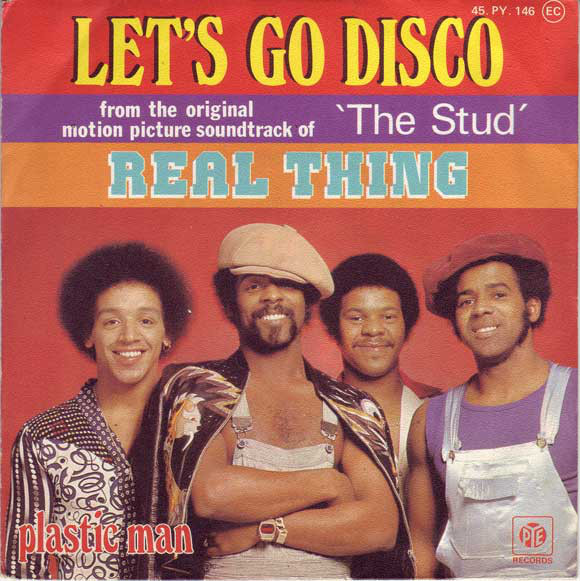
Eddie: I had an idea this question would rear its ugly head.We got a call from Tony Hall that Biddu wanted to try writing some songs with us, which we thought was rather odd. Anyway we got a call to say Biddu had a track that he wanted us to throw some vocals on so we went to his studio and he played the track to us.We felt the track was ok but we didn’t like the tune or lyrics, however as it took an hour or so to do our vocals and didn’t see the harm in doing it, thinking it was never going to see the light of day .Then we got a call from Tony Hall advising that the track was going to be featured in a huge Joan Collins movie and they wanted to cash in. The record company were considering ‘Disco’ as a single if we were guaranteed a spot in the movie performing the song. We were mortified but as we had dipped out feet in very muddy waters we couldn’t get out of this. So we had to see it through ….I think the phase “the less said the better works here”.
Fitzroy: Was there any concept link to Star Wars in writing the top 5 hit ‘Can You Feel The Force?’ a massive continued break through for the group?
Eddie: I had this idea for a song called ‘Get The Message’ and me and Chris were knocking it about and trying a few things. I went to see Star Wars and straight away I got a buzz for a possible hook with the force in it. We sat down and we built it around that phrase line “There’s a mood going around the world today …Can you feel the force” .
Fitzroy: ‘Can You Feel The Force?’, I loved the energy of that record and it was the very first 12-inch I boughtand you got to do Top Of The Pops even with that blip you mentioned that went out in America.
Chris: ‘The Force’ first time around actually outsold ‘You To Me’ selling more copies and was a top five record.
Fitzroy: For me personally I loved ‘Boogie Down’. (Chris: “Yeah, it was different wasn’t it?”) which was slower funkier and a continuation of ‘The Force’.
Chris: You know where that went wrong was that Ken and Lynton didn’t produce that song. If we had kept working with Ken it would have been bigger. We had a magic with him where he would have sussed the little things that were missing, We recorded ‘Boogie Down’ in France and the demo was much better and funkier but the best version was remixed by John Luonga which was received well in America.
Fitzroy: Though there were several underground UK soul outfits FBI, Gonzales, Cymande and even Sweet Sensation who endured a shorter commercial appeal similar to yourself, The Real Thing were flying the flag solo for an all black / predominately black group. Hot Chocolate were seemingly more accepted as a multicultural crossover success,but theres no escaping resistance element and racism blatant or subtle. You’d have faced this in and out of the music industry between the 60‘s and 70‘s with the changing face of Britain. So how did you and the rest of the group view and deal with getting the musical balance and compromises needed to make things work?
Eddie: This is how we see it Britain is a white country and its biggest crossover will always be the rock based bands or the ‘blue eyed boy bands’ that is fact and cannot be altered. This is the reason many talented black bands like Loose Ends have not prevailed and gone on to achieve what should have. Therefore once you succeed in getting your audience the trick is to hold on to it, while retaining your creative integrity. Sadly I see a lot of bands who have arrived but just going around earning their money and not trying to advance themselves with the power of their show. You cannot do anything about the subtle racism of show biz and the media, but our show is our direct link to our audience, and that’s were we make our stand. When we walk out there on stage be it an arena, a theatre or a club we always give it our all. So the people who actually dig us are not disappointed and will keep coming back. To summarize you cannot fight the racism that subtly closes doors to you and denies you credibility for what you have achieved, but you can make the best of what you have got.
Fitzroy: In the late 1970’s most of the UK black acts were from London, but I struggle to think of many black acts other than Rebecca Ferguson more recently who came from Liverpool. You must on one hand be proud to represent your race and also coming from Liverpool, which transcends the immediate African Caribbean community because Liverpool people love being Liverpudlian. I’d like to think that there will be some kind of monument to honour The Real Thing. What do you think will be the legacy of The Real Thing as a band whose been universally going for over 40 years and next to the Rolling Stone are the an institution for flying the flag of home grown mature Britain’s Got Talent?
Chris: I think I’d like us to be remembered as a black band who created their own brand of music. Who from day one have not tried to emulate their American counter parts but tried to maintain the level they set. One thing about black music and what I’ve learned is that in order to sustain and last the distance you have to be good. It’s not about a look it’s about having class. I think we open the doors for a lot of British music and kept the flag flying. I’m like you Fitz black music is always evolving, where as white music stays the same. If you dug out the Rolling Stone from 1960 they are the same now as they were then, but older. If I’m judging I listened to The Temptation in 1970, by the time I’m 20-22, I’m starting to listen to Earth Wind & Fire, then I’m progressing to Marcus Miller and Earl Klugh. So it’s evolving all the time as it’s not easy to keep that base you start off with in black music. I want us to be remembered as a band who has kept the music evolving throughout the decades, does that make sense?
Fitzroy: You have experienced first hand from the early 60’s the infrastructure of the Liverpool 8 black community mixed with African and West Indians who frequented the Ibo Yorbo Silver Sand Gladray, Dutch Eddies and Stanley House venues, according to our Soul Survivor member Raph Parkinson ( a native and local to that area black Liverpudlian). With Liverpool’s cultural and colonial economy history how would you describes the black communities significant contribution to music UK and beyond, as it doesn’t appear to be universally recognized or rarely gets mentioned?
Eddie: I have my own take on L8 s contribution to the UK music scene. The thing that shaped the Mersey beat explosion which in turn helped to reshape the whole British music scene for years to come, was the exposure to the music of artistes such as Chuck Berry, Little Richard, Fats Domino, Ray Charles and The Coasters. Followed later by Motown acts such as the Miracles Little and Stevie Wonder. Almost the first words The Beatles said to us when we first met them was “Have you heard the artistes on this new label out of the States, The Miracles, and there’s this little blind kid called Stevie Wonder?” If you asked me what I felt our contribution was it would be this…like us or hate us WE became the first UK Black group to to be taken seriously and to be allowed to write and produce our own songs. Therefore we set the trend which has grown in strength ever since.
Fitzroy Facey (The Soul Survivors Magazine)
The Real Thing are performing at Soul Train’s August Bank Holiday event @ SWX Bristol with a full live band 25th August 2017. They will be performing their classics mentioned in this interview, so I’d get your tickets and make sure you ‘Boogie Down, get funky now’. Buy tickets from https://www.ents24.com/bristol-events/swx-bristol/the-real-thing/4935102
This is no April fools. Today is Gil Scott Heron’s earthday, he would have been 68 years young. Gil Scott Heron is without doubt one of the genius wordsmiths of the 20th and 21st Century. As well as doing his own material, he was not afraid to cover other esteemed artists like Bill Withers’s ‘Grandmas Hands’ and Marvin Gayes’ ‘ Inner City Blues’. Providentially Marvin Gaye died on 1st of April 1984 and may of us who love him probably thought it was a sick joke. The sad irony is that Marvin Gaye died aged 44 the day before he was born 2nd April 1939 almost 10 years bar one day before Gil Scott Heron. Both were uniquely talented and are regarded as eternally loved and respected soul survivors to infinity and beyond. One of my other passion’s is art and here are two Blue Peter drawings I did earlier of Gil & Marv and I will spin a tune or two tonight with them in mind at my gig later . “Makes Me Wanna Holla & Throw Up Both My Hands”
At random moments when I wax lyrical with my antidotes of metaphoric ‘cult diction’, you will see sometimes I’ll refer to something I’m doing on my own as being ‘Napoleon Solo’. No prizes for guessing it was inspired by other than the late actor Robert Vaughn’s side kick character, to his Man From U.N.C.L.E agent partner Illya Kuryakin. As a kid growing up in the mid 1960’s and 1970’s I was a huge fan of Man From U.N.C.L.E with its cool funky jazz theme tune. Robert Vaughn was the epitome of ‘Cool Like That’ like Digable Planet, in his slick suits and always had a variety of the most intriguing facial expressions (especially the Elvis Presley pout trout), when he acted. Also known for his character as the nervous drunk gunman Lee in The Magnificent Seven, he was also a guest star on occasion in episodes of Columbo. Just one more thing..In recent years he was remembered for being the respected elder con man in the BBC series ‘The Hustle’ as a loveable father figure rouge Albert Stroller. Sad to hear of his passing aged 83. ‘Another One Bites The Dust’ like Queen.
It really was a Throwback Thursday on 27th October 2016. I really had and ‘Eddycation’ chatting with musical genius and social commentating activist, Guyana’s favourite son Eddy Grant. This photo was taken by his daughter Pauline Grant at the end of our very intimate and afternoon soiree at a coffee house establishment in Dalston east London. This will be documented in issue 67 for the festive December 16 – January 17 issue of The Soul Survivors Magazine.
My next royal appointment was to meet the mighty three T’s, Tavares, The Four Tops and The Temptations at the 02 in Greenwich. I was offered tow pairs of seats one in the VIP lounge way up in the balcony top and a pair in block B row N to the right of the stage near the front, whats a boy to do? ‘It Only Takes A Minute’ to have decided upon the option of being nearer. Tavares were for me the premier performing act with Chubby on lead vocals, they were smooth polished and reminiscent of the panache of that classic old school ‘doo woo’ quartet era they come from. Both the The Four Tops and The Temps gave an equally all singing and dancing performance and I was fortunate to have a ringside few at stage level 10 feet away, courtesy of Tavares’s manager David Oriola. Having met Ralph and Chubby Tavares, here we proudly display my interview with Ralph Tavares in the current Royalty issue. Unbeknown to me I then bump into The Temptations’s musical director, the legendary McKinley Jackson of The Politicians, as we left the backstage area. Sometimes..just sometimes ..I really like my job and vocation in life being married to my spiritual wife MUSIC!!
Greetings on this pinch punch first of the month and defo no returns 1st July 2016 Froback Friday. There certainly seems to be a massive “Ball Of Confusion” like The Temptations for peoples state of mind here in the UK since last weeks double Brexit and Punch & Judy show antics within politics in both the red and the blue camps. It’s been an emotive week of more twist and turns than a theme park roller coaster or an out of control tornado. But there is no Leroy Burgess “Confusion” about my digital memory of today’s post. 1986 was a vintage year that would impact on my life unknowingly for various reason. It was the spring and summer of that year when Kim Basinger and Mickey Rourke corrupted my not so innocent mind with the ‘sexsational’ at the time film “Nine And A Half Weeks”, but I just threw that in to get your attention.
Seriously 1986 was the year I started djing in the west end of London at a night club called “Oxfords” at the Tottenham Court Road end of Oxford Street, that apparently used to be Studio Valbourne, or so I’ve been advised. I made my debut alongside my fellow Pleasure loving music enthusiast Norman Cummins, on an Easter Bank Holiday Monday in April 1986, after contacting a fellow soul survivor comrade Joel Karamath, who had access to hiring the club. In short a now dearly departed and talented friend Debbie Miller, was leaving our front of house team at the musical “Starlight Express’s” home venue The Apollo Victoria Theatre, to do her first professional dance job. She was well loved and we managed with little time to pack the club out with those who were going to miss her presence. Joel teamed myself and Norman up with two guys I’d seen out but never previously conversed with Wayne Malcolm and Tony Francis who did the early set. This was the providential start of an Indeep “Last Night A DJ Saved My Life”
The night was an overwhelming success and as a bonus both myself and Norman were paid £50 each, when we were only doing this free for the love of a friend. A lightbulb went off in Joel’s head and he asked if we (myself ands Norman) would be interested in working with him and the other two dj’s, plus another who wasn’t present that night, on a regular Saturday night residency. I was most certainly interested and about 6 weeks later we got the nod it was actually going to happen. On the opening Saturday night in June 1986 it was then that I met this young man in the photo for the very first time. His name is Paul Martin and as collective of 6 we dj’d under the guise initially as “The Buzzboyz Inc”. This name concept as I’ve been advised was originally devised by Tony Francis who had been djing with his friend Wayne previously under this umbrella and working with Joel on various events. That may fill in the blanks as to why I was known initially as “Fitzroy from The Buzzboys” which became “Fitzroy The Buzzboy” which eventually morphed into “Da Buzzboy” Fitzroy, coined around 1998 by Summer Soulstice’s Jamie Topham then working in club promotions at Arista Records.
To cut a longer story short Norman left early after landing a dancing job abroad and the remaining Enid Blyton “Famous Five” did various gigs together until I left in February 1989 and went as Napoleon Solo free agent. Paul Martin who lived local to me in Wembley west London when I met him, was selling 7 inch imports with his mate a record dealer Mark, to some of the top underground warehouse and ‘Rare Groove’ funk Dj’s in London. I remember buying quite a few things like Kellee Patterson’s “I’m Gonna Love You More” on a 7 inch promo and The Chakachas “Jungle Fever” promo from him at his mums house. Paul went on to make his own history working at Steve Jervier’s Black Market Records in D’Arblay Street Soho, and was later snapped up by Giles Peterson to work at the newfound UK label division of Talking Loud. Myself and Paul forged our own musical paths outside of the our initial collective foundation, and over the years we have crossed paths many times. It’s always been good and mutually respectful whenever I see Paul when he is out and a “Jeremy Beadle About”. These days we tend to bump into each other at private industry parties, like last year at Louie Vega’s Ministry of Sound album launch, and on Tuesday 28th June 2016 at Angie Stone’s soiree in St Martin Lane’s The Library Gentleman’s club in WC2. I asked my IT consultant and magazine photographer Anna B to take this photograph, as it suddenly dawned upon me at Angie’s gathering, that Paul and I first met and dj’d together 30 years ago..That impromptu meeting was no accident. Happy 30th to us in my 30th year djing and 10 years in the making of The Soul Survivors Magazine that first hit the streets this month in 2006..”Happy Days” like Fonzie..”Ayyyyeeehhh” and a set of double thumbs up!!
Here are extracts from my interview with Bill Curtis a few years back ahead of the Fatback appearing at CampSoul in August
I’ve spoken to Robert Khallis Bell of Kool & The Gang, Larry Blackmon of Cameo and Randy Muller of Brass Construction who all confirm that there was a big street funk fraternity out of New York and the East coast.
That’s right and Fatback opened the doors for that so the record companies wanted their own versions of that. What happened at Perception was the label was going broke and our first two albums just about earned him his money he borrowed from family. He was going bankrupt and said it nothing personal but he left us stranded without a deal. Whilst shopping for a new deal and coming out of Polydor records my lawyer hooked us up with Spring Records after looking at the dubious contract that Mercury was offering.
I remember when I hooked up wit you at Southport 2005 you told me that your track “Dance Girl” was controversial with The Rimshots and you were going to sue them, why was that?
They stole it and took my tune and didn’t pay me royalties and thats another one that came out of “Going To See My Baby” you can tell. Remember what I told you earlier bout the formula? That’s what I used throughout my Fatback career.
But they did credit you on the track eventually
Yeah they did but I didn’t get no money. Not one penny but we worked out an agreement. Joe Robinson wasn’t the most up and up person in the world but he paid me back after I sent some people who represented me to talk to Joe and he ensured we performed with The Moments whenever they did a show.
After the 3rd and last Perception album you join Spring/ Polydor’s Event label. “Mr Bass Man” is a killer but “Keep On Stepping” (That was the big record on there and we’ll be doing that when we come over) and “Wicky Wacky” would become the club anthems. By this time the bass lines of Johnny Flipping would simulate one of a reggae ilk on both those tracks. How much did the Caribbean and reggae influence have on the band as much later this would be evident with Spanish Hustle and Night Fever?
Remember what I told you I got my beat from ?? It came from the reggae from the calypso but what I did was put a 2 and 4 back beat to it which the reggae didn’t have. So by us playing cabaret dances the people loved calypso music and with that New Orleans feel that influenced the Fatback Sound. Now if you listen to “Going To See My Baby”, four tunes came out of that like “Wicky Wacky” and “Bus Stop”. At night we’d play them tunes differently and never the same way twice. So when we went to the studio we’d written another tune on top of it and perform it unconsciously but we were not aware of that. When you have a band thats working every weekend they are writing tunes in between.
“Raising Hell” and “Yum Yum” albums with their sexy funk disco, jazz and Caribbean flavours remain two of my favourite albums that endured a degree of commercial success. “Raising Hells’s” “Bus Stop” created a dance craze to be capitalized 5 years later by another bullet on the future “14 Karat” album. How did you receive that adulation as this did catapult the group into the commercial arena more-so I guess in the UK than the USA?
I never knew until Gerry Thomas came to the UK with Jimmy Castor and said they playing the hell out of “Bus Stop”. When I first came to England I toured with a little van and did bars cabaret places and in the little country towns and built my own following before I did big concerts .
My 50 shades of play minutes @ SSW6
Just spreading the love with John Morales and Frank Ryle of Cool Million in the photo from my debut at Yogi Haughton & Caroline’s Scottish Soul Weekender. This was my second set on the Sunday of 50 Shades Of Play Minutes.. so click the link in “Prince Purple “and enjoy… Fitzroy

